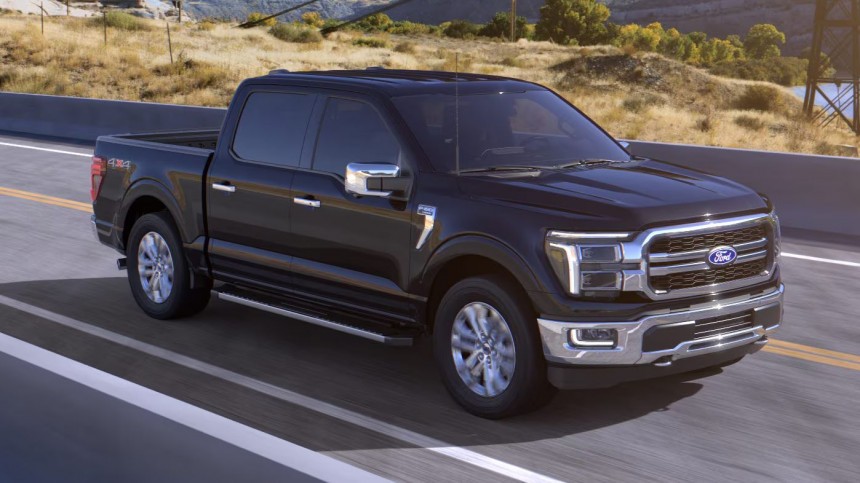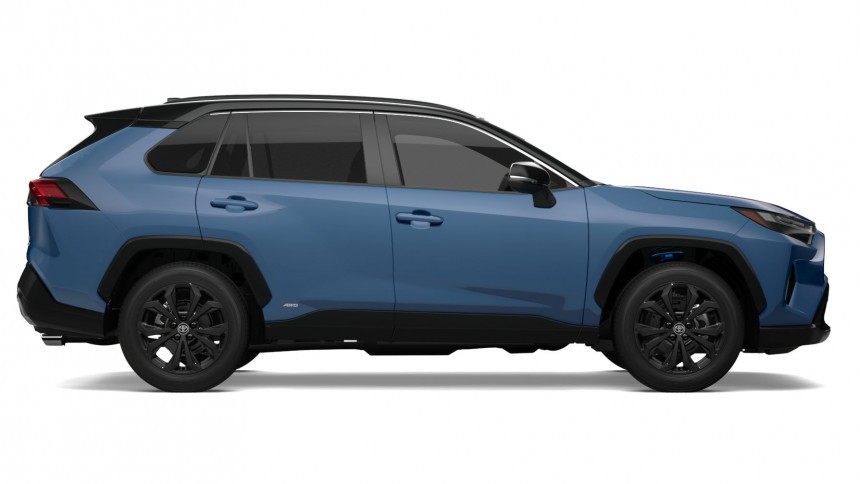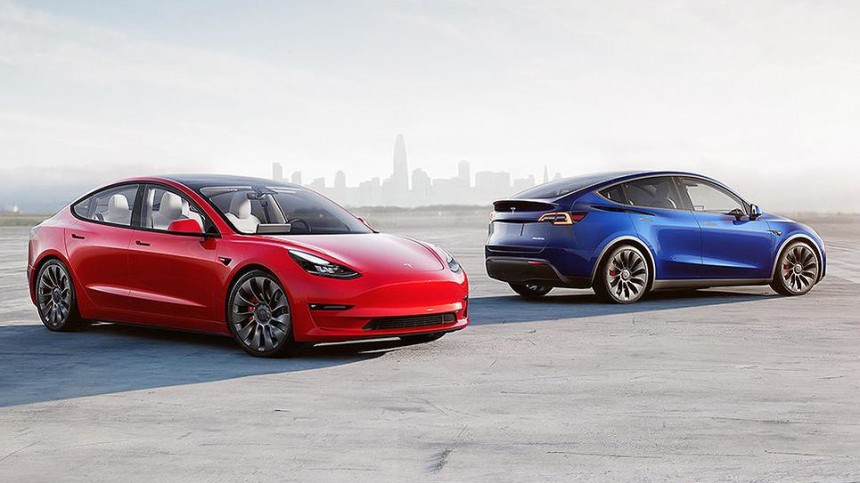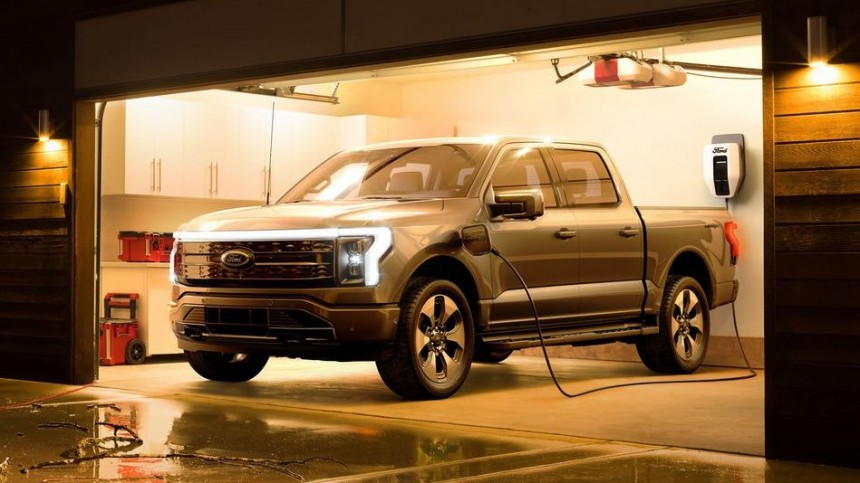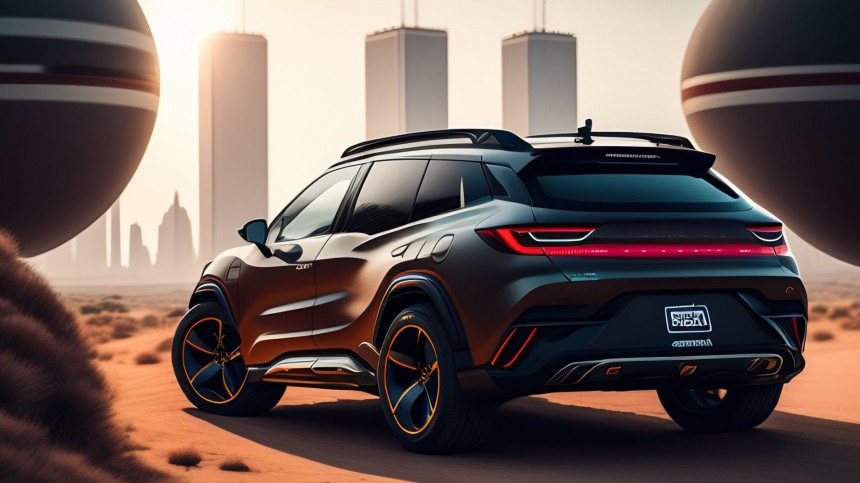The "EV market slowdown" is already old news, as are carmakers' delaying plans to launch new electric models due to "market conditions." High prices of EVs are allegedly a barrier for customers, but one could hardly call "affordable" the best-selling cars in the US. Numbers tell a different story.
People want to buy affordable cars, that's for sure, but new cars are not cheap. You can only expect a small city car between $15-20,000 or even a little sedan with an extra booth, but there are only a few models in this price range.
What an American calls a proper car is usually north of $20-25,000, and most deals out there are around $30,000 or more. Actually, the average price for a new car has already passed the $45,000 mark, so cars are more expensive overall.
However, this is not primarily because EVs are more expensive. In the last months, we have witnessed a price war like never before because of fierce competition and carmakers trying to fight the drop in interest from prospective buyers (thank you, anti-EV propaganda!).
You would be wrong to think I'm biased, although I'm an EV proponent. That's why it's worth examining American buyers' preferences in 2023 and the first quarter of 2024. I'm sure you'll conclude the same: the lack of cheap electric cars is not the main problem for people losing interest in EVs.
2023 was a better year, especially for trucks and SUVs
According to official data, the total number of new passenger trucks, SUVs, and cars sold last year in the US exceeded 15.6 million units, a 12% increase compared to 2022. But it's not the two-digit increase that bothers me.
More than 12 million of these vehicles were pick-up trucks and SUVs – almost four times more than normal cars! Let me put it like this: for every sedan sold, there were three larger, heavier, more guzzling, and, of course, more expensive trucks or SUVs. Do you still wonder why the average price for a new car is so high?
The first three spots of the 2023 car sales rank go to the pick-up truck realm: the Ford F-150 Series (750,000 units), the Chevrolet Silverado (540,000 units), and the Ram Pickup (445,000 units) gathered more than 1.7 million orders.
This value is around 11% of the total number of passenger trucks, SUVs, and cars sold last year, and it also represents 14% of all the pick-up trucks and SUVs sold in 2023.
The first two spots didn't change in the first quarter of 2024, but the Ram Pickup lost third place to the hybrid SUV Toyota RAV4. So, the trend favors bigger cars and gasoline engines, although there's a sharp increase in hybrid powertrains thanks to fuel savings.
Now, let's talk about prices. The starting prices of the F-150, Silverado, and Ram were around $40,000, give or take. However, because of their superior trims and more powerful engines, most customers paid around $45-50,000 for them. I'll let you decide if "forty or fifty grand" sounds affordable.
In the 2023 ranking, the Toyota RAV4 came in fourth place (starting from around $30,000), while the world's best-selling EV, the Tesla Model Y (starting from more than $40,000, with ups and downs throughout the year), came in fifth.
While the difference between the two is around $10,000 (translating to 25%), only 11% more RAV4 SUVs were sold than the electric Tesla SUV (435,000 vs. 386,000 units). But get this: the Model Y benefited from the $7,500 EV tax credit, so it was only a few thousand more expensive than a comparable RAV4.
To be fair, let me give you the other five contenders of the TOP 10:
- Honda CR-V (compact SUV, rivaling RAV4): 361,000 units / starting price from around $30,000
- GMC Sierra (full-size pick-up truck): 295,000 units / starting price from around $40,000
- Toyota Camry (hybrid medium-size sedan): 290,000 units / starting price from around $27,000
- Nissan Rogue (compact SUV): 271,000 units / starting price from around $29,000
- Jeep Grand Cherokee (luxury SUV): 244,000 units / starting price from around $42,000
So, the most popular ten models last year totaled 4 million units (25% of the total new cars sold in the US in 2023), and their average basic price was over $35,000. If we remove the electric Tesla Model Y and replace it with the Toyota Tacoma (no. 11 in this rank, starting from around $30,000), the average basic price drops just below the $35,000 mark.
Keep in mind that this is the average price for the best-selling gasoline and hybrid models in 2023. Also, we should note that five are full-size pick-up trucks, four are SUVs, and only one is a four-door sedan. In short, they were hardly affordable ICE cars.
The funny thing is that models closer to what we can call affordable, like the Corolla (starting from less than $25,000) or Subaru Crosstrek and Honda Civic (starting at around $26,000), were less popular than the TOP 10 contenders. Actually, their volumes were on par with those of other compact SUVs, like Chevrolet Equinox or Hyundai Tucson.
What about the ten best-selling electric cars in 2023?
Of the more than 15 million new cars sold in 2023, around 1.4 million were 100% electric. That's less than 10%, but get this: compared to 2022, new EV sales increased by 40% (the overall market grew by only 12%, and EVs had their share for that increase)!
So, yeah, I guess there's something fishy about the statement that "people don't buy EVs anymore"… Of course, in the first quarter of 2024, there was a mere 2.6% increase in EV sales, which can give the impression of imminent doom – depending on who you listen to.
Now, let's get back to our 2023 ranking. As you probably already know or imagine, the first two spots are a Tesla affair: Model Y (around 386,000 units) and Model 3 (some 232,000 units). Add the Model S and the Model X (both in TOP 10), and you shouldn't be surprised that Tesla's EV market share is almost 50%.
As expected, thanks to the EV tax, Model Y's basic price was around $40,000, while Model 3's was $35,000. Of course, the vast majority of customers chose more expensive trims (longer range batteries,doh!), but my point is that these models were basically at the same price level as the ICE models in the previous rank - which is… hardly affordable.
The third model was actually a pair: the Chevrolet Bolt EV & EUV convinced only 62,000 customers. However, thanks to the EV tax, it had a very low entry price - a little over $20,000, almost the same as the small SUVs KIA Soul, Chevrolet Trax, or Nissan Kicks.
Unexpectedly, the fourth place was occupied by another pair: Rivian's R1T pick-up and R1S SUV. I said "unexpectedly" because these are expensive cars, starting from around $75,000. Still, some 47,000 customers opted for these models - double the orders for the F-150 Lightning, which started $20,000 lower!
The following models were like this:
- Ford Mustang Mach-E (compact SUV): 40,000 units / starting price around $40,000 before tax incentive
- Volkswagen ID.4 (compact SUV): 37,000 units / starting price around $40,000 before tax incentive
- Hyundai Ioniq 5 (medium crossover): 34,000 units / starting price around $40,000 before tax incentive
- Tesla Model S (luxury sedan): 26,000 units / starting price around $76,000 before tax incentive
- Tesla Model X (luxury SUV): 24,000 units / starting price around $81,000 before tax incentive
- Ford F-150 Lightning (full-size pick-up truck): 24,000 units / starting price around $52,000 before tax incentive
The average basic price of the ten best-selling EVs in 2023 was around $51,000, but thanks to the EV tax credit, it dropped to less than $45,000. This is ten thousand more than the average basic price of the TOP 10 ICE cars. So, what does that mean?
It's not the "most affordable" that really matters
Of course, the first conclusion is that electric cars are more expensive than their ICE or hybrid counterparts. So, I could end this article blaming higher prices for the "EV market cooling down." But, as always, the devil's in the details.
For instance, it's almost impossible to properly compare the electric Ford F-150 to gasoline or hybrid variants. The most affordable F-150 today is the XL 2WD Reg Cab 6.5' Box, starting at $35,830. The Lightning starts from $51,990, and after the EV tax credit deduction, the $45,000 basic price is still ten grand more than the entry-level gasoline.
But get this: the Lightning is only available as a 4WD SuperCrew 5.5' Box – the most affordable similar gasoline variant is the XL 4WD SuperCrew 5.5' Box, starting at $46,655. This is a little more expensive than the electric variant after applying the EV tax credit!
The problem is that Ford can't afford to make a more affordable electric F-150, similar to the entry-level gasoline F-150, because battery costs are still too high. Also, such an electric workhorse wouldn't be practical enough for the average customer because of its lower range and charging headaches. I'm just being down-to-earth.
What about the RAV4? Today's most affordable 2023 model starts at $29,625 (the gasoline FWD variant), while the Hybrid requires around $3,000 more. Well, the most popular trim in 2023 wasn't the most affordable gasoline powertrain, but the hybrid one, closer to the $35,000 mark.
Tesla Model Y is not quite a similar car, but it's close enough for a fair comparison in terms of space, performance, and comfort equipment. The basic price of $46,630 makes for a compelling offer after the EV tax credit deduction, which makes the entry-level Y cost less than $40,000.
That's still around $5,000 more than the popular RAV4 Hybrid, but we should also note that Tesla is way more evolved in terms of performance and equipment - it's a premium car, after all. Still, for such an EV, the real challenge is the range, and thus, the Long Range variant (starting from $50,000 before tax incentive) was more popular.
Frankly, there's no match between the 425 electric horsepower, less-than-4.5-second sprint AWD Model Y, and the top-of-the-line RAV4 Hybrid 4WD XSE (302 HP and around 8-second sprint). But there's a common ground: neither RAV4 nor Model Y customers are looking for the most affordable variants but for the best-for-bucks ones.
We could go on with many other examples like these, trying to compare gasoline or hybrid models and electric models. We'll only find out that Americans are willing to pay more for bigger and more equipped cars, no matter the powertrain.
Actually, there's no race for more affordable cars, although this is the main narrative about electric cars. The appetite for pick-up trucks and SUVs is a strong hint. Of course, many best-selling trucks are company workhorses, but the private customers clearly opt for the more expensive variants.
Just as companies usually buy entry-level EVs or those with smaller batteries, private customers are more interested in the longer-range variants with bigger and more expensive batteries. This is how things work, so the real challenge for carmakers is not making cheap electric cars.
The real challenge is to create compelling electric rivals for gasoline and hybrid SUVs, primarily in the $30-35,000 price range, with a similar range and without the help of subsidies. It's almost a David vs. Goliath situation; for now, "David" is under much pressure.
In the end, we should acknowledge that Americans simply don't want cheap electric cars, just as they don't really care about cheap new gasoline or hybrid cars. Am I wrong? Please remind me what the next car you want to buy is.






